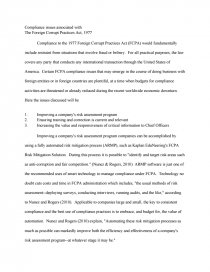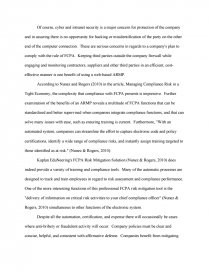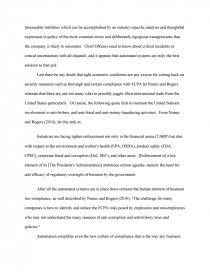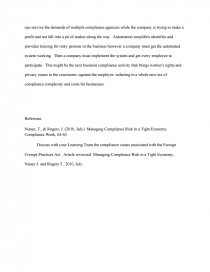Compliance Issues Associated with the Foreign Corrupt Practices Act, 1977
Essay by cindiorose • February 1, 2013 • Research Paper • 1,008 Words (5 Pages) • 1,482 Views
Essay Preview: Compliance Issues Associated with the Foreign Corrupt Practices Act, 1977
Compliance issues associated with
The Foreign Corrupt Practices Act, 1977
Compliance to the 1977 Foreign Corrupt Practices Act (FCPA) would fundamentally include restraint from situations that involve fraud or bribery. For all practical purposes, the law covers any party that conducts any international transaction through the United States of America. Certain FCPA compliance issues that may emerge in the course of doing business with foreign entities or in foreign countries are plentiful, at a time when budgets for compliance activities are threatened or already reduced during the recent worldwide economic downturn. Here the issues discussed will be
1. Improving a company's risk assessment program
2. Ensuring training and correction is current and relevant
3. Increasing the value and responsiveness of critical information to Chief Officers
Improving a company's risk assessment program companies can be accomplished by using a fully automated risk mitigation process (ARMP), such as Kaplan EduNeering's FCPA Risk Mitigation Solution. During this process it is possible to "identify and target risk areas such as anti-corruption and fair competition." (Nunez & Rogers, 2010) ARMP software is just one of the recommended uses of smart technology to manage compliance under FCPA. Technology no doubt cuts costs and time in FCPA administration which includes, "the usual methods of risk assessment--deploying surveys, conducting interviews, running audits, and the like," according to Nunez and Rogers (2010). Applicable to companies large and small, the key to consistent compliance and the best use of compliance practices is to embrace, and budget for, the value of automation. Nunez and Rogers (2010) explain, "Automating these risk mitigation processes as much as possible can markedly improve both the efficiency and effectiveness of a company's risk assessment program--at whatever stage it may be."
Of course, cyber and intranet security is a major concern for protection of the company and in assuring there is no opportunity for hacking or misidentification of the party on the other end of the computer connection. These are serious concerns in regards to a company's plan to comply with the rule of FCPA. Keeping third parties outside the company firewall while engaging and monitoring contractors, suppliers and other third parties in an efficient, cost-effective manner is one benefit of using a web-based ARMP.
According to Nunez and Rogers (2010) in the article, Managing Compliance Risk in a Tight Economy, the complexity that compliance with FCPA presents is impressive. Further examination of the benefits of an ARMP reveals a multitude of FCPA functions that can be standardized and better supervised when companies integrate compliance functions, and that can solve many issues with ease, such as ensuring training is current. Furthermore, "With an automated system, companies can streamline the effort to capture electronic code and policy certifications, identify a wide range of compliance risks, and instantly assign training targeted to those identified as at risk." (Nunez & Rogers, 2010).
Kaplan EduNeering's FCPA Risk Mitigation Solution (Nunez & Rogers, 2010) does indeed provide a variety of training and compliance tools. Many of
...
...



